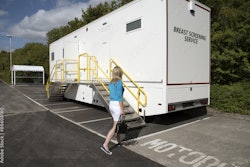A bill introduced this week in the U.S. Congress is angling for federal grants, contracts, and cooperative agreements for new mobile cancer screening units.
Rep. Paul Ruiz, MD, (D-CA) and others have been championing efforts to fund convenient cancer detection strategies. While the text of HR 10506 introduced December 18 is not available, it will be focused on essential screening services in rural and underserved communities, according to a brief summary.
Research is currently determining the impact of mobile cancer screening for breast, cervical, prostate, and colorectal cancer on healthcare and other costs. Cancer mobile screening models can vary, but most involve mobile mammography.
For example, a $1.5 million grant made it possible for University of Florida Health Cancer Center to launch its multicancer Mobile Cancer Screening Connector this fall, funded in part by the university's Office of the President’s strategic funding initiative. The unit offers 3D mammography and is staffed by a team of radiologists, physicians, advanced practice registered nurses, and health workers.
Virginia Commonwealth University (VCU) Health, however, launched a mobile PET/CT scanner in June that provides a whole-body scan in 17 minutes or less, according to VCU. The 50-foot trailer branded VCU Health travels between VCU Health locations to provide rapid scans for patients waiting for cancer screenings. A spokesperson for VCU Medical Center said the team there worked for 18 months to identify areas where they could increase access to care.
A study by the Harvey L. Neiman Health Policy Institute published November 26 demonstrated that mobile mammography is generally used by women otherwise unlikely to be screened and does not cannibalize facility-based mammography.



















